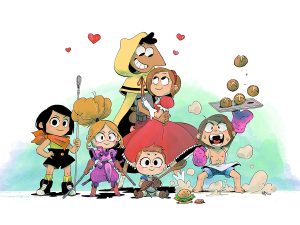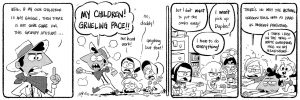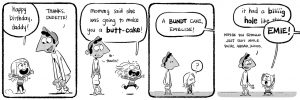An interview with Anthony Holden, the winner of the 2016 AML Comics Award for his collection Precious Rascals. The interview is conducted by Brittany Long Olsen, the winner of the 2015 AML Comics Award. Precious Rascals is a collection of comics chronicling the life and times of the Holden family, encapsulating the last 8 years of their lives raising a house full of wild children. Anthony Holden lives in Oregon, where he spends his daytime hours trying to balance playing with children while making art for film, television, comics, and books. His favorite breakfast food is waffles. His comics and drawings can be found at: twitter, facebook, instagram, and tumblr.
As seen in Precious Rascals, you’ve been making comics about your family for many years. What made you decide to collect them into a book at this point in time?
I’ve shared the strips with family and friends for years and years. Many of those people have prompted me to consider putting them in a book for some time. I never felt like the audience was large enough until recently when my online following had grown to a point that I felt like I could justify having boxes of books taking up half our garage.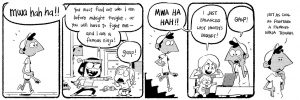
I’ve shared the strips with family and friends for years and years. Many of those people have prompted me to consider putting them in a book for some time. I never felt like the audience was large enough until recently when my online following had grown to a point that I felt like I could justify having boxes of books taking up half our garage.

How much input do your kids and wife have into what events make it into comics about them? Do they regularly keep up on what you’ve drawn?
I almost always run the strips by my wife before I post them. Sometimes they get vetoed. 🙂 If they do, I usually just wait awhile and then show her again when the memories of misbehaving children are no longer stinging in our very recent memory. I’ll show the kids what I’m working on whenever they wander into my office, or they’ll catch up on strips while scrolling through my phone sometimes.
We usually have a sort of look we share between each other at times when something particularly memorable has happened, like, “that’s gonna be a comic, for sure.”
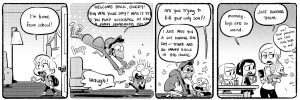
The animations you’ve made of certain comics are so charming. How do you decide which comics to animate?
The process of animating is so time-intensive, I have to be really careful about picking which jokes to animate or I get really behind schedule really fast. I like comic strips because I can craft one–from writing to finished strip–usually in a couple of hours. Since Precious Rascals is an after-work-hours project, I like to stick with strips mainly. However, there are certain jokes that are just funnier when viewed as little looping animations. When a joke is obviously plussed by the addition of animation, I try to do it. If I happen across an idea like that, it’s usually BEGGING me to animate it while I’m drawing the sketches for the strip, and I usually can’t ignore that urge, so I give in and animate it.
Given that you have to balance full-time work with these comics about your family, how much time do you allocate to Precious Rascals comics? Do you have a set schedule or do you make these comics when inspiration strikes, so to speak? How has that changed over the years?
When I was first doing the strips, I’d just sort of make them whenever something notable happened. It was really hard to find time to make strips when our kids were very young, because of the demands on our parenting time. We were usually just so tired–I don’t have many strips from that era, though I wish I’d kept better notes because funny stuff was happening all the time. Nowadays I try to be pretty regular about creating strips. My goal is one a week. It’s a challenge to fit it into my schedule with everything else we’ve got going on, both with our family obligations, church service, and professional development (after-hours work projects) in addition to my full-time work. I do think Precious Rascals has become an important document for our family though, so I try to be really regular about making strips. I find that they’re easier to do if I get them done earlier in the week, so I usually try to find time on Monday or Tuesday. Then I can balance the rest of the demands of the week, knowing I’ve fulfilled my comic strip goal! (I also reward myself with chocolate.)
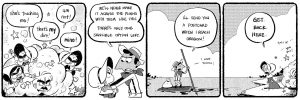
Some of the comics in Precious Rascals have blatantly Mormon content while others are more subtle (like referring just to church or Bible study). When first posting these comics online, what informed your decision about including this type of content? Did you have a goal in mind when illustrating your Mormon family?
Well, the strips are mainly for our family first. That’s why I started making them, but then I realized that the jokes were resonating with a larger audience. I decided early on that I wouldn’t conceal details about our family’s faith. I do my best to just be true to who we are. If something funny happens during Book of Mormon Stories time, or on a Sunday while we’re getting ready for church, I document it as closely to what actually happened as possible. I feel like that sort of presentation helps to normalize the living of our faith. I don’t want to be overbearing–the comics are not a missionary tool explicitly, but I also want to be honest about who we are, so I keep all the Mormon stuff in. It has almost always yielded positive results. Occasionally there are negative comments, but I choose not to engage people that want to fight. On the other hand, it has led to some great missionary moments with direct messages and emails I get from fans sometimes!
When I was first doing the strips, I’d just sort of make them whenever something notable happened. It was really hard to find time to make strips when our kids were very young, because of the demands on our parenting time. We were usually just so tired–I don’t have many strips from that era, though I wish I’d kept better notes because funny stuff was happening all the time. Nowadays I try to be pretty regular about creating strips. My goal is one a week. It’s a challenge to fit it into my schedule with everything else we’ve got going on, both with our family obligations, church service, and professional development (after-hours work projects) in addition to my full-time work. I do think Precious Rascals has become an important document for our family though, so I try to be really regular about making strips. I find that they’re easier to do if I get them done earlier in the week, so I usually try to find time on Monday or Tuesday. Then I can balance the rest of the demands of the week, knowing I’ve fulfilled my comic strip goal! (I also reward myself with chocolate.)

Some of the comics in Precious Rascals have blatantly Mormon content while others are more subtle (like referring just to church or Bible study). When first posting these comics online, what informed your decision about including this type of content? Did you have a goal in mind when illustrating your Mormon family?
Well, the strips are mainly for our family first. That’s why I started making them, but then I realized that the jokes were resonating with a larger audience. I decided early on that I wouldn’t conceal details about our family’s faith. I do my best to just be true to who we are. If something funny happens during Book of Mormon Stories time, or on a Sunday while we’re getting ready for church, I document it as closely to what actually happened as possible. I feel like that sort of presentation helps to normalize the living of our faith. I don’t want to be overbearing–the comics are not a missionary tool explicitly, but I also want to be honest about who we are, so I keep all the Mormon stuff in. It has almost always yielded positive results. Occasionally there are negative comments, but I choose not to engage people that want to fight. On the other hand, it has led to some great missionary moments with direct messages and emails I get from fans sometimes!
One of your most circulated comics online is about focusing more on accumulating life experiences than a rigid art education. That said, can you tell me more about your art education? When did you decide you wanted to make art for a living?
So, like most kids, I drew when I was younger. I’d always liked drawing and I did it all the time. Sometime in high school, teachers and friends pointed out to me that I was maybe a little better than average at drawing, so I kept doing it. Mostly because it was fun. I had dreams of becoming a comic strip creator, but the newspaper industry was dying and I wasn’t feeling brave enough to jump into a burning building, so I just sort of kept it up as a hobby. I drew a comic strip for the newspaper of a community college I attended in Connecticut, but I didn’t have any real professional aspirations at the time.
Later I transferred to BYU to study Japanese. It was my mission language, I was pretty good at it, and speaking Japanese was my only real employable skill, I thought at the time. While I was at BYU I found out about the animation program while reading a copy of BYU Magazine. The article talked about former students who had gone on to careers in the arts (some at major studios). Until that time I had never considered that you could make a respectable adult career out of drawing. My wife and I talked and prayed at length about what we should do, and ultimately felt good about pursuing the major. (I couldn’t give up studying Japanese though, so I kept doing that.)
Nowadays I spend most of my professional time storyboarding. It’s funny to think that the first time I had heard of a storyboard was in 2006. Four years later I’d be drawing them for work.
Apart from having wild adventures with a sketchbook in hand, what resources/advice would you recommend to someone pursuing a similar path?
So much of this career path is in the making. The best education comes in doing–drawing, painting, analyzing, readjusting, and drawing again. There comes a point when you’ll get as far as you can get on your own. At that point, you have to turn to others with more experience and better eyes, to see what you can’t and help you improve. That can be a professor, a mentor, a talented friend. It can be at a university, technical school, or online program. The key to growth is seeking out experiences, and trying new things. It’s super uncomfortable, but it’s the only way to get better. You have to swim with big fish. Hold your own work up to the work you admire and see what’s lacking. Try to improve in small specific ways, one at a time. Be patient, because growth is SLOW.
Have faith, work hard, and don’t forget to have fun. Those of us on this path are probably on it because we love it. If you ever get to a place where things get overly frustrating, go back to basics and remember what it is that you love about pursuing this crazy arts dream. Remember the fun, and the struggle becomes worthwhile!

